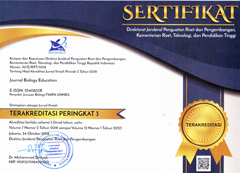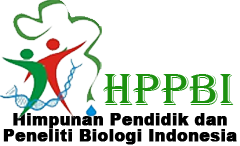Development of Innovative Teaching Supplement "RESPICOV" to Improve Student Learning Outcomes and Awareness of Respiratory System Health
Keywords:
Human Respiratory System, Innovative Teaching Supplement, COVID-19, Learning Outcomes, Care AttitudeAbstract
The development of innovative teaching supplement is adjusted to students’ needs and to complete exiting teaching material. Based on TP 11.8 until 11.11 for class XI in the Merdeka Curriculum, topic is preceded by fact and concepts which are followed by the application of these concepts in daily life. Innovative teaching supplement is developed by integrating fact and research results, especially related to respiratory system and COVID-19. The purpose of this study is to develop innovative teaching supplement “RESPICOV” to improve students learning outcomes and awareness of respiratory system health. The study was Research and Development with pre-experimental one group pretest-posttest design. The entire students of grade XI SMAN 1 Pemalang on academic year 2023/2024 was chosen at the population. The method in taking the example was purposive sampling, class XI.4, XI.5, and XI.6. Observation, questionnaire, interview, and test were methods that used in collecting the data. The result showed that the innovative teaching supplement “RESPICOV” is very worthy and effective to increase student learning outcome at 0,71 on N-gain analysis and awareness of respiratory system health at very care category. Based on the result, in can be conclude that the innovative teaching supplement “RESPICOV” is very worthy and effective to be used in material of respiratory system to increase students outcome learning and awareness of respiratory system health.





